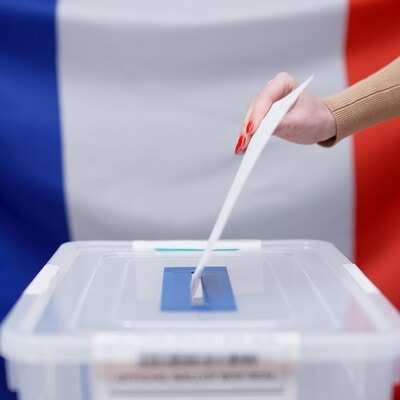Marine Le Pen’s far-right National Rally (RN) party won a commanding lead in the first round of France’s parliamentary elections on Sunday, moving closer than ever to forming a government in the second round and dealing a major blow to centrist President Emmanuel Macron and his risky decision to call bold elections.
According to the final results released by the French Interior Ministry on Monday, amid an unusually high turnout, the RN coalition won 35.15 percent of the vote, with the left-wing New Popular Front (NFP) coalition coming in second with 27.99 percent and President Macron’s centrist Ensemble Union slipping to third place with just 20.76 percent.
Click here to connect with us on WhatsApp
How did France get here?
President Macron dissolved the French National Assembly on June 9 after it was defeated by the French RN in the European elections, betting that the RN, which has anti-immigration stances and historical ties to anti-Semitism, would not be able to repeat its success with France’s own fate at stake.
“The far right is opening the door to power,” Atal said, describing the Rally National’s policy pledges as “disastrous.” He added that “not a single vote should be cast for the Rally National in the second round. France should not suffer this.”
If she can secure a majority in parliament, RN leader Le Pen could install her 28-year-old protégé, Jordan Bardella, as prime minister.
If that outcome were to materialise, Macron may find himself facing the prospect of spending the remaining three years of his presidency under an opposition prime minister.
However, reports suggest that while the RN coalition is set to win the most seats in the French National Assembly, it may fall short of the 289 seats needed for an absolute majority. Experts have told media that this could result in France being left with a hanging parliament and increased political uncertainty.
With just a week of campaigning left before the final vote next Sunday, the outcome of the French election remains uncertain.
Explaining France’s early parliamentary elections
*What’s at stake?
The general election could either give France its first far-right government since World War II or result in no majority at all.
*Who is running?
The three main political forces are the far-right National Rally, the New Popular Front coalition which includes the centre-left, the Greens and far-left forces, and President Macron’s centrist coalition.
*How are French parliamentary elections conducted?
To win, a parliamentary candidate needs to receive at least 50% of the vote on the day of the election. If they don’t, the top two candidates advance to a second round of voting.
What would a far-right victory mean for France?
The RN party argues that anti-Semitism is now a problem among the French left and has shifted its focus to immigrants and Muslims.
As a result, an RN victory could have major implications for France, home to Europe’s largest Muslim community.
The RN party, co-founded by Le Pen’s father, Jean-Marie Le Pen, has been seen as a threat to French democracy for decades, seen as a party that promotes racist, anti-Muslim and anti-Semitic views.
The 52-year-old party’s early members included former members of the Waffen-SS, the Nazi-controlled army during World War II.
But after years of efforts by Marine Le Pen to clean up its image, the renamed party, formerly known as the National Front, is gaining political momentum.
Yet the famously anti-immigration party has maintained its traditional principle, known as “people first,” which would mean that if the RN came to power, French citizens would be given priority over foreigners when it comes to jobs, housing and social assistance.
The RN has made the introduction of “national priority” through a constitutional referendum a top priority, and has also pledged to exclude dual nationals from certain strategic state positions.
Other top priorities for the RN include imposing strict border controls and abolishing birthright citizenship, the centuries-old practice that has granted citizenship to people born in France to foreign parents.
What about French foreign policy?
Bardella has recently softened and even reversed some of the RN’s earlier positions, for example denying allegations that some of his party members have ties to the Kremlin, while also reversing course on Ukraine and saying the party would continue to provide military support to Kiev.
But Bardella also recently said he opposed sending French troops and weapons capable of attacking Russian territory to the conflict.
Experts say Macron’s stance on Ukraine is unwavering and that France is playing its role as a pillar of the European Union.
They argue that a French government led by Bardella, who is less committed to the EU, would mark a major change.
(Courtesy of the Associated Press)

